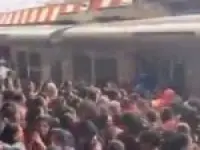
Passenger Trains Redesignated As 'Express Specials'; Fares Doubled
The Indian Railways has quietly transitioned several passenger trains to ‘express specials’, resulting in nearly double the fare for some routes.
Marking the end of an era, the ‘second class ordinary fare’ for passenger trains has been erased and been replaced with express fares which are double the previous rates for commuters travelling in the express specials. While this shift is expected to strengthen the financial standing of the railways, it presents a heavy burden on economically disadvantaged passengers who rely on these trains for affordable transportation.
Also known as the lifeline of the poor and the middle class, the passenger trains” primary demographic includes farm workers, small vendors, daily wage labourers as the trains were affordable. However, with the redesignation, the scenario has changed.
Reports indicate that the fare hike affects routes such as Chennai to Tirupati, Chennai beach to Vellore, and Chennai Egmore to Puducherry. The cost of travel from Chennai to Tirupati has increased to Rs 70 from the previous Rs 35 pre-Covid era, while other routes have seen similar increases, with fares rising from Rs 30 to Rs 65 and Rs 45 to Rs 80, respectively.
In the Chennai division, the transition from passenger trains to Mainline Electric Multiple Unit (MEMU) or Diesel Electric Multiple Unit (DEMU) trains has taken place.
Following widespread complaints, the South Western Railway took corrective action by restoring the pre-Covid fare structure in its zone. A recent order issued by the Principal Chief Commercial Manager instructed authorities to revert to the second-class ordinary passenger fare for all MEMU/DEMU and passenger trains, aligning with pre-Covid pricing norms.
According to railway officials, the price hike was dependent based on the classification of the train – passenger or express train – and not on the stoppages, as per a report by The Hindu. “The railways have dispensed with second-class ordinary fare applicable to passenger trains post the pandemic. There are no more passenger trains,” stated the railway official.
According to The Hindu, “Going by the rules, passenger trains are defined as passenger-carrying trains, which stop at almost all the stations enroute. These trains are slower by character and have lower fares than mail/express trains. Express trains are those which are faster and don’t stop at all stations. It appears that the decades-old concept of operating passenger trains has been dispensed with after the pandemic,” a railway official stated.
Despite the backlash from passengers, the Indian Railways has reaped significant financial benefits from this transition. The Southern Railway reported its highest-ever revenue of Rs 6,345 crore in the passenger segment last year, marking an impressive growth of 80 percent compared to the previous year.
Although, the railways have yet to make a formal announcement regarding the re-designation of passenger trains as express specials, the trains are still called passenger trains but maintain an increased fare price.













